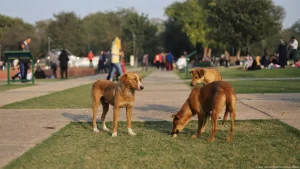In a significant development for Delhi dog control measures, thirty dedicated volunteers met with Mayor Raja Iqbal Singh on Wednesday, offering comprehensive support to the Municipal Corporation of Delhi’s (MCD) Animal Birth Control (ABC) centres. This collaborative approach represents a significant step forward in addressing the city’s growing concerns about aggressive dogs while ensuring humane treatment throughout the process.
The volunteers presented a multi-faceted support system that includes providing food and medicines, identifying aggressive dogs, and ensuring the humane transportation of canines to ABC centres. This initiative represents a community-driven solution to enhance Delhi dog control operations and bridge the gap between civic authorities and animal welfare advocates.
 Also Read: New Delhi Dog Control Measures
Also Read: New Delhi Dog Control Measures
More From Us: Big Supreme Court on stray dogs in New Delhi
Mayor Raja Iqbal Singh welcomed the volunteer initiative, stating that thirty dog lovers visited him and assured they would share contact details of another 500 people willing to assist the municipal veterinary department in catching aggressive dogs. This expansion of the support network demonstrates the community’s commitment to improving Delhi’s dog control measures through collaborative efforts.
The volunteers have also requested permission to visit ABC centres with medicinal and nutritional supplies, showcasing their dedication to ensuring proper care for the animals. Singh confirmed that the civic body would accept their assistance, recognising the value of community participation in effective Delhi dog control implementation.
Animal lovers Jitender Kochar and Rosy Virk from Malviya Nagar and Alaknanda emphasised their commitment to minimising human-dog confrontations through the Delhi dog control program. They expressed support for catching attacking dogs and taking them to correction centres while stressing the importance of understanding the underlying reasons for aggressive behaviour.
“We are not against catching attacking dogs and taking them to correction centres. But there is a need to understand the reason for their aggressive behaviour. We will also ensure that these dogs are not hurt when they are being caught,” explained Virk, highlighting the humane approach integral to successful Delhi dog control operations.
Following the Supreme Court’s directive ordering civic authorities to capture and relocate community dogs, the Delhi dog control initiative has gained significant momentum. The mayor reported that the veterinary department had successfully taken in 150 dogs from various localities by Tuesday evening, with a focus on dogs identified as being aggressive.
The civic body has organised its Delhi dog control efforts into 25 specialised teams operating across 12 zones. This systematic approach ensures comprehensive coverage and efficient response to residents’ complaints about aggressive or diseased dogs. Singh announced plans to accelerate the process based on community feedback and safety concerns.


However, challenges persist in implementing Delhi’s dog control measures. Current ABC Rules allow keeping aggressive dogs for only 10 days for observation, creating uncertainty about permanent sheltering arrangements. An MCD official noted the lack of clarity regarding steps to be taken after the initial observation period.
The financial implications of the expanded Delhi dog control program are significant, with MCD estimating costs of at least Rs 110 per dog per day for proper care and housing. The civic body is actively discussing potential sites for permanent shelters, including a 75-acre site at Ghogha, the Dwarka ABC Centre, and locations in Masoodpur.
These financial and logistical considerations are crucial for the sustainable implementation of Delhi dog control measures. The civic body must balance cost-effectiveness with humane treatment standards while ensuring adequate facilities for the growing number of dogs requiring care and rehabilitation.
To streamline complaint handling and improve response efficiency, the Delhi dog control program will continue utilising the existing 311 app and 155305 helpline for dog-related complaints. Currently, there are no plans to establish a separate dog-bite helpline number, maintaining the integrated approach to civic service delivery.
Officials are considering implementing microchipping for street dogs as part of the Delhi dog control strategy. This technology-driven approach would reduce errors and provide detailed information about sterilisation and immunisation records, including which NGO performed the procedures and the specific dates of treatment.
Councillors emphasised the need for a comprehensive dog census to implement effective immunisation and sterilisation programs throughout the Delhi dog control initiative. This systematic approach would provide accurate data for resource allocation and program planning.
 From next week, a specially formed sub-committee will begin visiting ABC centres to assess their arrangements and operational status. Yogesh Verma, councillor from Keshavpuram and sub-committee member, noted that some ABC centres are currently non-operational, requiring investigation and remedial action.
From next week, a specially formed sub-committee will begin visiting ABC centres to assess their arrangements and operational status. Yogesh Verma, councillor from Keshavpuram and sub-committee member, noted that some ABC centres are currently non-operational, requiring investigation and remedial action.
The Delhi dog control program plans to involve activists in facility visits during later phases, ensuring transparency and community oversight. This collaborative approach strengthens the program’s credibility and effectiveness while maintaining high standards of animal welfare.
Workers will receive handheld devices to support the technological aspects of the Delhi dog control program, enabling accurate record-keeping and efficient data management. This technological integration represents a modernised approach to animal management and community safety.
The comprehensive Delhi dog control initiative demonstrates the city’s commitment to balancing public safety with animal welfare through community collaboration, technological innovation, and systematic implementation of humane practices.

